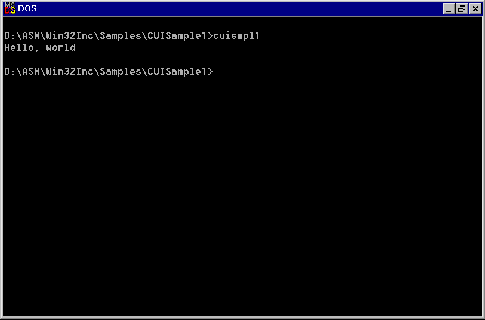
| in case you don't believe me |
 |
| WINCUI1.ASM |
;--- the simplest Win32 hello world console application
.386
.model FLAT, stdcall
option casemap:none
ifndef __POASM__
.nolist
.nocref
endif
WIN32_LEAN_AND_MEAN equ 1
include windows.inc
ifndef __POASM__
.list
.cref
endif
;--- CStr(): macro function to simplify defining a string
CStr macro pszText:VARARG
local szText
.const
szText db pszText,0
.code
exitm <offset szText>
endm
.code
main proc c uses ebx
invoke GetStdHandle,STD_OUTPUT_HANDLE
mov ebx,eax
mov esi, CStr("Hello, world",13,10)
invoke lstrlen, esi
push 0
mov ecx, esp
invoke WriteConsoleA, ebx, esi, eax, ecx, 0
pop eax
ret
main endp
mainCRTStartup proc stdcall
call main
invoke ExitProcess,eax
mainCRTStartup endp
end mainCRTStartup
|
ifndef __POASM__
.nolist
.nocref
endif
|
|
This is a PoASM issue, nothing WinInc specific. This assembler does not understand some of MASM's reserved words and will
flag them as errors. By using the predefined equate __POASM__ one might
avoid those catches.
|
WIN32_LEAN_AND_MEAN equ 1
include windows.inc
|
|
WinInc will understand all declarations contained in the MS Platform SDK.
Setting WIN32_LEAN_AND_MEAN to 1 will avoid to include the full Win32
header set, thus increasing assembly speed.
The rest of the code does not contain anything specific to WinInc. What's missing compared to MASM32 are things like |
include \masm32\include\kernel32.inc
include \masm32\include\user32.inc
|
| because in WinInc the function prototypes are not located in separate files. |